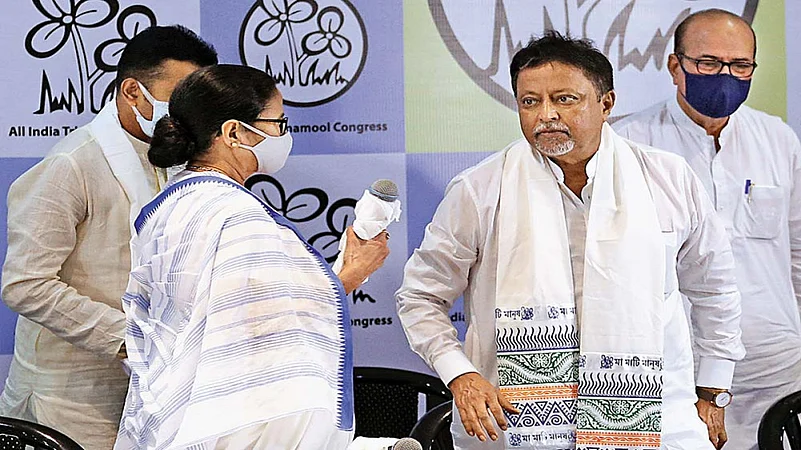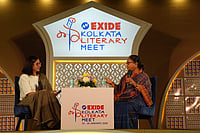On June 14, after meeting Bengal governor Jagdeep Dhankhar along with other BJP MLAs, Suvendu Adhikari, the new leader of the opposition in the state assembly, told journalists that 17,000 BJP supporters had fled their homes because of the terror unleashed by the Trinamool Congress, and that the police had launched over 3,000 cases implicating BJP workers. “We will approach the court. They can’t stop us by intimidation,” Adhikari said. The extent of ‘intimidation’ is debatable, but clearly, five weeks since the declaration of election results, the BJP has a humongous task ahead in keeping its house intact.
So far, only one big name—the biggest of all TMC turncoats—has dumped them: Mukul Roy. Whether or not Roy plays a pied piper, at the panchayat and zilla parishad level, the flow of elected public representatives from the BJP to the TMC is noticeable. Most say they are inspired by Mamata Banerjee’s leadership. Among the prominent faces seeking to switch camp is former minister Rajib Banerjee, whom the BJP had flown to Delhi along with other TMC deserters. He has not kept in touch with the BJP since losing the election, publicly criticised it for targeting Mamata despite her massive mandate and paid ‘courtesy visits’ to two TMC leaders—Partha Chatterjee and Kunal Ghosh. Besides other factors, the state of leadership in the BJP is itself brittle.
After its victory, the TMC looks rock solid under Mamata and her nephew, Abhishek Banerjee. The success has ended all speculation around the role and position of Abhishek. He now looks like the undisputed heir to his aunt’s political legacy. Even returnee Mukul Roy, once Mamata’s right-hand man, has accepted the new hierarchy. There is, in short, unity of leadership.
In contrast, Adhikari, BJP state president Dilip Ghosh, and leaders Swapan Dasgupta and Tathagata Roy are issuing statements on cross-purposes. It appeared on June 8 that Ghosh had no idea Adhikari had gone to Delhi to meet the party top brass, including PM Narendra Modi, Amit Shah and BJP president J.P. Nadda. The Bengal BJP had a state unit meeting convened by Ghosh on June 8. “He knew of this meeting. He has still gone to Delhi. I have no idea why. The leaders in Delhi may know,” Ghosh told the media.
Adhikari, on the other hand, said he could not inform Ghosh personally, but had requested state general secretary Amitabha Chakraborty to tell Ghosh. Adhikari asserted that equations with Ghosh were ‘very good’. But, says a BJP state general secretary, “he is looking to cement his position in the party hierarchy and we can sense a cold tension between him and Ghosh”. A BJP MP adds astutely: “Unlike Mukul Roy, Adhikari has burnt his bridge. He cannot go back to the TMC. So, he needs the BJP and the BJP leadership also finds a safe bet in him. His rise will cause grievances among old-timers.”
The atmosphere of mistrust and suspicion over desertions that stalked the TMC before the polls has now engulfed the BJP. On June 12, Tathagata Roy tweeted that Mukul Roy was ‘clearly’ a Trojan Horse who gained access to the BJP’s all-India leaders, learnt all about the party and “went back and leaked everything to Mamata”. Roy wondered if there were more Trojan horses left in the BJP.
On June 14, Swapan Dasgupta countered this in a tweet, saying, “It is wrong to view everyone who joined BJP in Bengal after May 2019 as Trojan horses.”
That there is significant disaffection among BJP leaders formerly with the TMC—and the party is full of them at every level—was evident when former TMC MLA Dulal Bar, who joind the BJP in 2019, publicly expressed his grievances at being denied a ticket by the BJP.
To add to the BJP’s confusion, Mamata has said that the TMC would not accept all deserters back, but those who left the party answering the call of Mukul Roy would be considered. A list of such people includes some BJP MLAs and MPs.
By Snigdhendu Bhattacharya in Calcutta


























